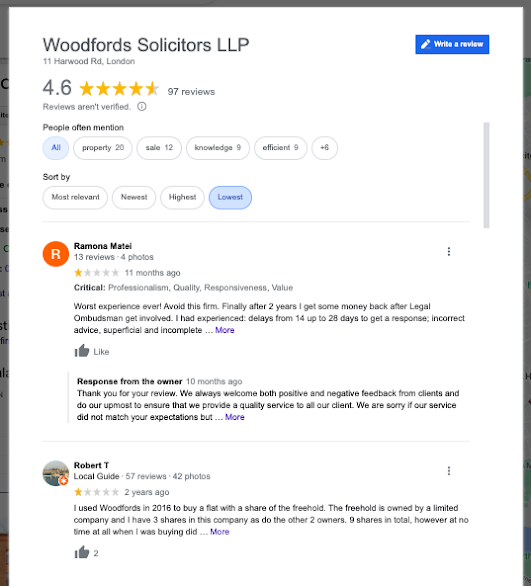How often do we meet a business basking in the glory of what they consider a great Google score? Daily, probably.
To be fair, it's almost certainly taken a considerable effort to achieve that score, and no one wants to be told they need to do more when they reckon they've already done all they can. But that's why HelpHound exists: to enable businesses to successfully build - and improve - on their already great efforts.
To return to our headline: why is a Google score of 4.6 'not enough'? It's all in the numbers. Let's look at two examples.
The business with few Google reviews...
While no business would relish a review such as that written by 'Jack Forest' above, most sensible consumers will discount one or two such negative opinions. The business has, quite correctly, responded, thus neutralising, as far as possible, the impact of the original review. The impact on the business's score, however, bringing it down from a perfect 5.0 to 4.7 remains.
A note for those who, understandably, think the review above is 'unfair' (the business has made clear in its response that they have no record of any dealings with the reviewer): Google's conditions for removing reviews are very tightly drafted indeed. That does not mean the business should not appeal to Google to have the review taken down - we conduct such appeals on behalf of businesses and are sometimes gratified when they succeed when apparently not in contravention of Google's terms of service. If in any doubt whatsover, consult us.
The business with many Google reviews...
First: respond to each and every review.At least then the readers - potential customers - will see that the business takes their customers' reviews seriously. Don't argue - thank them for their feedback (albeit sometimes with teeth gritted) and sign off with a name, not 'customer services'. Remember who your core audience is: all those potential customers who will be reading that review.Second: institute a proper review management programme.At first sight a hundred reviews may seem like a lot, but it's only two a month for four years.Businesses that build moderated reviews (see 'Third' below) into their CRM, by incorporating them into all their marketing, online and off, and their sales pitches, and then 'warn' their customers that writing a review is the norm, get very high response rates when they ask for the review.
Third: - and most important of all going forwards - adopt a moderated review management system.Over ten years of experience has led us to conclude that over eighty percent of inaccurate, misleading or just plain unfair reviews will be addressed by a properly moderated review management system. Simply inviting reviews - on your website, in your correspondence and face to face - means that the likelihood is that your unhappy customer/client/patient will post their review to you first, enabling an independent* moderator such as HelpHound to step in and enable such reviews to be corrected before they are published on your website or on Google.
And when a 1* review does find its way to Google, how much more powerful is the response that says 'Thank you for posting this review, here is our response to you....if, in future, you feel that we haven't performed to the best of our ability please don't hesitate to contact me directly or write your review via the button on our website, where you can be assured of a response on the very same day.'
The Golden Key...
Is this link on the business's website (the Write a review button)...
Leading to this box...
Once the review is submitted it is automatically sent straight to a moderator where it is checked for accuracy and then either posted to the business's website or referred back to the reviewer for correction. All reviewers, whether their review has been corrected or not, are then invited to copy their review to Google. Simple, effective - in protecting the business's reputation from unfair and inaccurate comments - and compliant.
- Moderation - the 'Golden Key' to review management: a detailed analysis and explanation
- Compliance - many businesses are unaware that selecting customers to invite to write reviews is illegal. Moderation means that such selection - often done to protect the business - becomes redundant
- Results - moderated review management doesn't only protect businesses from unfair and inaccurate reviews, it drives enquiries through Google and the business's own website
Our answer: if we were ever found to be favouring the business - or even more seriously, attempting to suppress a fairly-held negative opinion - all our credibility would simply vanish. Our name would be terminally tarnished and our moderation process, besides becoming questionable in the eyes of the regulator, would lose all value in the marketplace.









No comments:
Post a Comment
HelpHound is all about feedback, so please feel free to comment here...